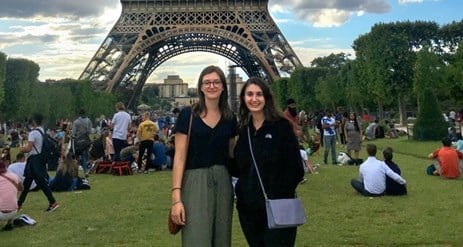
Through more than 7,000 miles of travel together, Sophie Partington ’21 and Laura DeMassa ’21 have gone from friends in French class to roommates in Italy and research partners in France.
Partington, a sociology and French double major, and DeMassa, a government and English double major, are European studies minors who spent last summer exploring the evolution and impact of national immigration policy in France. Their in-depth research – conducted in French and including field interviews at NGOs serving the immigrant population – assessed whether obligatory French language training is beneficial to migrants.
This undergraduate research collaboration was a first for the Institute for European Studies (IES), part of the Mario Einaudi Center for International Studies.
The IES funded both students as fellows to work on an ambitious joint research project. The pair received a total of $8,000 in funding; Partington received IES’s Susan Tarrow Summer Research Fellowship, DeMassa the Frederic Conger Wood Fellowship.
“I think the reasoning behind wanting to work jointly embodies what research ideally looks like,” DeMassa said. “It’s a conversation.”
Inspired by a European history class in her freshman year, Partington found herself searching for more classes on Europe. DeMassa wound up taking classes on Europe, as well, and they took part in the Cornell Summer Program in Turin, a course in Italy for students interested in European politics and policy.
“After the Cornell in Turin program our freshman summer, my interest in European studies really solidified,” DeMassa said.
When their paths crossed again in a French class during their sophomore year, Partington and DeMassa would often spend time discussing class material and their own interests.
“It was during those conversations that we realized how much we have in common,” Partington said. “That’s when the idea for a research collaboration was born.”
In search of common ground between Partington’s interest in sociology and DeMassa’s interest in law and policy, they landed on a topic that reflects their shared interest in French language and personal experiences as language learners: the role of obligatory language training in French integration policy.
Their research concluded that while France’s policy aims to bolster migrants and help them to assimilate, visible inequalities arise through the policy’s practical implementation – as immigrants’ language-learning results suggest. They presented their work at an IES student research symposium in November.
“This is the first time that IES hosted a symposium where undergraduate and graduate recipients of the institute’s grants showcased their research,” said Maria Goula, director of IES and associate professor of landscape architecture. “Explicitly asked to reflect on their process and findings, their presentations were extraordinary.”
DeMassa and Partington are currently writing a paper for future publication.
“IES has provided a space for my questions and helped me work toward finding answers,” DeMassa said. “It’s a place where I’ve been able to put what we’re learning into practice in a way that is both valuable and relevant.”
The Einaudi Center’s undergraduate minors – including international relations, East Asian studies, Southeast Asian studies and the new migration studies – help students understand and engage with international places and people.
In addition to the fellowships awarded to DeMassa and Partington, IES offers a range of undergraduate funding opportunities to promote and support research in Europe. Grants and fellowships also include graduate level funding opportunities, including the Luigi Einaudi Fellowship for students in modern European government, history, economics and related social science fields.
By: Priya Pradhan
Please visit https://news.cornell.edu/stories/2019/12/einaudi-minor-sets-students-international-research-path to view the original article.
Founded in 1978, the Council on Undergraduate Research (CUR) focuses on providing high-quality and collaborative undergraduate research, scholarly, and creative activity. Among the many activities and networking opportunities that CUR provides, the organization also offers support for the professional growth of faculty and administrators through expert-designed institutes, conferences, and a wide-range of volunteer positions. The CUR community, made up of nearly 700 institutions and 13,000 individuals, continues to provide a platform for discussion and other resources related to mentoring, connecting, and creating relationships centered around undergraduate research. CUR’s advocacy efforts are also a large portion of its work as they strive to strengthen support for undergraduate research. Its continued growth in connections with representatives, private foundations, government agencies, and campuses world-wide provides value to its members and gives voice to undergraduate research. CUR is committed to inclusivity and diversity in all of its activities and our community.
CUR focuses on giving a voice to undergraduate research with learning through doing. It provides connections to a multitude of campuses and government agencies, all while promoting networking and professional growth to its community.


